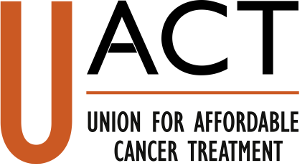The following are comments by the Union for Affordable Cancer Treatment (UACT) on the HHS Blueprint to Lower Drug Prices and Reduce Out-of-Pocket Costs, in response to the notice published in the Federal Register, 83 FR 22692.
Element II.B. of the notice asks, “What policies should the U.S. government pursue in order to protect IP rights and address concerns around compulsory licensing” in OECD countries, which “are not paying an appropriate share of the necessary research and development to bring innovative drugs to the market and are instead freeriding off U.S. consumers and taxpayers.”
1. UACT rejects the premise put forth by the Blueprint that OECD countries are “freeloading” when they negotiate lower-than-U.S. prices for patented medicines that are purchased or reimbursed.
2. Any purchaser is entitled to assess the value of a product to them and determine their own willingness to pay. Many OECD countries set reimbursement levels or accept prices according to their own evaluation of the value of a given medicine to their individual health systems.
3. UACT notes that the Trump administration has framed the issue of price disparities in terms of OECD members and “developed” economies. This is a helpful attempt to focus on higher income countries, and to avoid openly putting additional pressure on countries with lower incomes to raise drug prices. That said, the notion that OECD membership is useful in identifying higher income countries is out-of-date. The original 20 country membership and the early accessions could fairly be described as a club of rich countries. However, since 1989 the OECD has sought to expand to include several countries with lower relative incomes, such as Poland, Hungary and Mexico. The newest OECD member country is Colombia, a country that in 2016 had a per capita income of $6,310, which is just 11 percent of the $56,810 for the United States. There are 8 members of the OECD that had a per capita income less than $15,000 in 2016, and 16 members that had a per capita income less than 50 percent of the United States. The OECD is also in talks to extend membership to Argentina, Brazil, Costa Rica, Croatia, Peru and Malaysia. If the goal is to focus on countries that are high income, a standard that is linked to relative per capita incomes will generally make more sense.
4. When considering issue of sharing the burden of paying for research and development (R&D), UACT objects to focusing on drug prices or price disparities. As noted in a recent Congressional hearing by Secretary Azar, public sector expenditures on R&D play an important role in the discovery and development of new treatments. If a government has high prices, but has a system with inadequate insurance coverage for products or lower levels of public sector investment in R&D, the focus on prices misses the point.
5. High prices are often unjustified, relative to the value of the treatment or the investments in R&D.
6. High prices create barriers to access, leading to preventable deaths, shortened lives and unnecessary suffering, which is a massive public policy failure.
7. To address the cross border issues relating to biomedical R&D, the U.S. government needs to support measures to enhance the transparency of R&D outlays by both the public and private sector, and to stop blocking efforts to discuss global norms for public sector investments in R&D.
8. Compulsory licensing is a necessary remedy to address abuses on patent rights, including excessive pricing or restrictive licensing practices, and the United States should not discourage its use.
9. Compulsory licenses on drugs have in fact rarely been used by OECD members, even in cases where prices were excessive and patients did not have access to treatments. The one OECD member that has made extensive use of compulsory licenses has been the United States, in the context of patents on medical devices and diagnostic tests, by courts that used royalty bearing compulsory licenses as an alternative to granting an injunction to prevent the continued infringement of patents.
10. The focus of international policy in this area should be to enhance investments in R&D, including via public sector funding of R&D. Higher prices should not be a goal of U.S. policy.
11. In the future, OECD members (including the United States) should progressively delink R&D incentives from the prices of products and services. This may require some type of compulsory licensing of patents.
Annex, II.B from the FR notice
II. Responding to President Trump’s Call to Action
B. Better Negotiation
Fixing Global Freeloading. U.S. consumers and taxpayers generally pay more for brand drugs than do consumers and taxpayers in other OECD countries, which often have reimbursements set by their central government. In effect, other countries are not paying an appropriate share of the necessary research and development to bring innovative drugs to the market and are instead freeriding off U.S. consumers and taxpayers. What can be done to reduce the pricing disparity and spread the burden for incentivizing new drug development more equally between the U.S. and other developed countries? What policies should the U.S. government pursue in order to protect IP rights and address concerns around compulsory licensing in this area.
